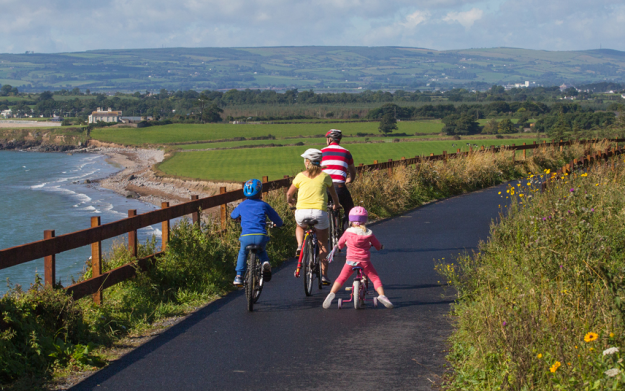IFA Meet Louth County Council to Highlight Farmer Concerns Over Dundalk to Carlingford Greenway

The IFA has met senior officials from Louth County Council and highlighted the serious reservations and concerns of farmers over the proposed Dundalk to Carlingford Greenway.
Louth County Council, in conjunction with TII (Transport Infrastructure Ireland), has proposed a 30km Greenway project to run from Dundalk Bay to Carlingford. The project is at the early stage of development, having completed a second public consultation during the summer, which is currently being assessed. It is estimated the project could impact between 200 to 300 farmer/landowners.
Speaking following the meeting in County Hall in Dundalk, IFA Infrastructure Chair Paul O’Brien said IFA outlined to Louth Council that Greenways should be predominantly developed on public lands and should avoid private farmlands, in line the 2018 Strategy for the Future Development of National and Regional Greenways.
The Strategy is clear in stating that “the preferred model for future Greenways is to use lands already in the undisputed ownership or control of the State, either through Government Agencies, Government Departments or Local Authorities.”
Paul O’Brien said the proposed Greenway for Cooley fails to follow this approach as the Council consultants confirmed that there are no public lands available other than on the public roads. The consultants confirmed that the route corridor options being considered are all on private farmlands.
“This is not consistent with the Government Strategy on Greenways. IFA also recently raised this issue at a high-level meeting with TII,” he said.
IFA also made it clear to the Council that the IFA is opposed to any severance of farms or compulsory purchase orders (CPOs) for amenity projects like Greenways.
IFA Louth County Chairman Kevin Sweeney said it appears that some parts of the proposed Greenway route being considered is planned to follow an old, abandoned railway line. However, he pointed out that this abandoned railway is now part of private farmlands and is actively farmed making it unsuitable for a Greenway.
Kevin Sweeney said farmers were very concerned over the disease risk and implications for their livestock herds from infrastructural projects such as Greenways, especially in relation to the increased threat from TB. “Disruption of the landscape for infrastructure works like Greenways and roadways is well known to disrupt badgers and wildlife and increase the spread of TB,” he said.
The Louth Chairman said IFA also raised serious farmer concerns over many other issues including privacy; security; boundaries; access, traffic and parking; anti-social behaviour; litter; dogs; environmental; and other issues.
Kevin Sweeney also pointed out to the Council that there is a longstanding and positive history of walks on the Cooley peninsula where farmers facilitate walkers’ permissive access to their lands.
He said for the development of any infrastructure, it is essential that there is strong community support, but this is absolutely not the case in Cooley. Farmers are very much part of the community, and they are understandably opposed to their land being subject to CPO.
“The TII cannot simply plough ahead and ignore the guidelines set out in the Code of Best Practice. It states that it is the clear intention to utilise State-owned lands to the greatest extent possible and minimise the impact on privately-owned land. There is basically no State-owned land along this route, which clearly makes this untenable,” he said.
Paul O’Brien said the meeting with Louth County Council was productive and informative and he thanked the Council Officials and project consultants for their engagement on all of the issues.
“Most importantly, the meeting provided the IFA with the opportunity to provide an in-depth outline of the fears and concerns of farmers regarding the proposed Greenway and how it could impact very significantly on farmers, their property and their farm businesses,” he concluded.




